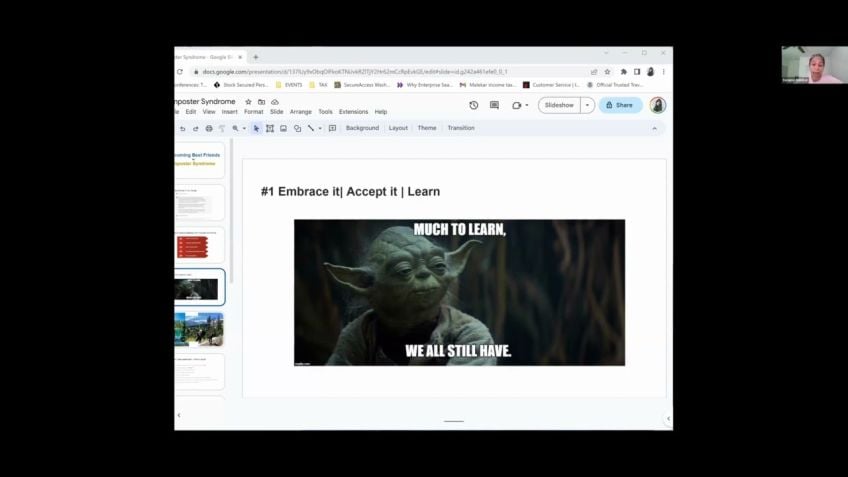Is Imposter Syndrome holding you back?
Imposter Syndrome: Are You Holding Yourself Back?
Hello, our loyal readers! Today, we delve into an important topic that's often undermined - Imposter Syndrome. You might ponder, "Do I have imposter syndrome?" or consider, "Why is Imposter Syndrome there?" Well, this blog post is designed to offer an insightful understanding of this phenomenon, its precedents, and practical ways to overcome it.
About the Speaker
Our guest today on this issue is Marlin Van Rod, an experienced sales director currently affiliated with an open-source technology company, SU. With over 20 years of experience primarily in the sales environment, Marlin has not only been a pivotal figure in the tech industry but consistently champions for diversity. An advocate for women in tech and sales, Marlin shares her enriching insights on imposter syndrome based on her personal experiences and professional observations.
Decoding Imposter Syndrome
Imposter Syndrome, though not a clinical diagnosis, is a widespread occurrence among successful individuals - and typically more common in women. It is the lingering feeling of being considered a fraud and being discovered as someone who’s “faking it” despite significant achievements.
Many of you may resonate with these thoughts: "I don't deserve this raise", "I'm really not sure I'm better than the others", or "That success was just pure luck." These are classic signs of imposter syndrome. It often leads to a sense of incompetence, stress, and burnout, impacting overall performance and job satisfaction.
The Imposter Syndrome Cycle
This issue spirals into what Marlin calls the "Imposter Cycle". It starts with self-doubt and anxiety, resulting in either overpreparation or procrastination. We then try to overcome these pressures, and even when the task is accomplished with positive feedback, we still dismiss it - attributing it to sheer luck.
But here's a point to consider: about 70% of us suffer from Imposter Syndrome. Yes, Imposter Syndrome is a common phenomenon which also affects notable figures such as Michelle Obama and Meryl Streep.
Different Types of Imposter Syndrome
- Perfectionists
- Superwoman/man
- Individualists or 'Soloists'
Identifying your imposter type is the initial step towards battling this issue.
Combating Imposter Syndrome
Having Imposter Syndrome is not something to be shamed about; it’s perfectly normal. However, it’s essential to be able to identify and differentiate these feelings from reality. Here are a few things to remember in overcoming Imposter Syndrome:
- Acceptance: Recognize that imposter feelings are normal and common.
- Acknowledge Your Strengths: Regularly remind yourself of your unique skills, qualities, and achievements.
- Mentorship: Seek successful individuals and mentors for guidance and confidence boost.
The Bottom Line
The reality is, what we think we know and what we actually know varies significantly. The knowledge gap that we perceive is often much smaller than we imagine. The only way to overcome the imposter feelings is by identifying these feelings for what they are and working towards self-improvement.
For those seeking practical tools, Marlin recommends books like "Secret Thoughts of Successful Women" and "Own Your Greatness" to help navigate through such feelings.
In conclusion, never let the imposter feelings take control. Break the silence, share your thoughts, and let's beat Imposter Syndrome together!
Stay tuned for more enlightening topics. Until next time!
Video Transcription
Hi, Anna. Thank you so much for having me today. Good morning. Good afternoon everyone. It's really great to be here today and talk about this really important um, topic. Um Why is imposter syndrome there? Is it holding you back? Do you have imposter syndrome?Um, a little bit about myself. I want to introduce myself. My name is Marlin Van Rod. I'm currently the um sales director at an open source technology company called SU um for the Emir region. I have a team of seven people. I have over 20 years of experience in it um mainly in the sales environment. Um I have three beautiful Children as you can see on the picture. They are in a black forest on the photo there. That's where I'm originally from. I'm living in London for over 20 years now. Um in my free time and in my spare time I try to be an output cut for women in cells, um for tech and I really try and drive diversity as I've had many obstacles over the years. Um being usually one of the only women in, in cells. Um Yeah. So today what's on the agenda? I want to talk about what is imposter syndrome? What are the signs? What are the typical attributes which make out that you may have imposter syndrome? Um, imposter syndrome is not like one thing. There are actually different types of imposter syndrome. So I will speak about the different types. Um And it could be likely that you um have one or two of those types. Um What can you really do to overcome imposter syndrome?
I will talk about what people do on a day to day basis and why those things are really not working and then I will provide some resources and um how you can proceed as it's really an, an ongoing journey. So, are you feeling like a fraud? Are you feeling like any minute you're gonna be found out? You have really no idea what you're doing? You're really buried, you think um you think you are behind others? Um So this, this thinking is very common in very successful women. Also, imposter syndrome is a phenomenon.
It's not a medical diagnosis the first time I, I heard it. Um And um I, I remember I was basically applying for a job and um I was talking to the recruiter telling her my accomplishments. And then when I went to see the company, um they felt afterwards I didn't really um come across, I didn't really show my accomplishments. So that was the first time I heard about impostor syndrome when the recruiter called me and she said, you know what, I'm really surprised about the feedback. I think you may have impostor syndrome. And I thought, wow, is this something from an Alfred Hitchcock movie? What is it?
So, um imposter syndrome is the feeling that despite your achievements and um it's very, very common with successful people that you still feel you are gonna get found out. You are not good enough and um you really, this inner feeling of um constantly trying, um trying your best and you feel like you're just not achieving anything you're always behind. Um, despite race, you feel like, no, that's, that's just, you know, that's just luck. Um So is this you, um, do you recognize any of these um, of these um feelings in your head? Like, oh dear, they are going to figure out. I have absolutely no idea what I'm doing. I'm really not sure I deserve this raise. My performance was really not good. All the others are so much better than me. Why should it be me? You, you are really feeling bad. Um If someone gives you a brace, you feel, no, that was just simply luck or that was due to someone else, um, supporting me. So, um, there are really signs about, um, these are signs about impostor syndrome. Do you feel um, a sense of incompetence? Do you feel actually stressed and burned out because you keep running? You keep trying and you just feel nothing is good enough. Um If you experience any of these signs, it's very likely you do have um imposter syndrome.
So, um people who have imposter syndrome do natural naturally try different strategies. They are holding back, they are trying not to, you know, to step forward. They're more in the background. They kind of quiet because they don't want to speak up. Um People are not finishing things, procrastination.
Have you heard about it? That basically means you are um you are putting things off, you, you have to do a task, but you feel like I really can't do it right now. I will do it later and then you start a project or you may, you may never even start this project and actually you never finish. So it actually could be bad performance, you're holding back. Um It's um it's very hard for you to, to just keep going. So really, you are missing out. Um You um you may be missing out on job opportunities. People don't perceive you very well. So these coping strategies really don't work. Um The impostor cycle, I thought that was really interesting and I want to share this. So basically, it starts of you feeling like a fake, having self doubt, you feel depressed, you feel really anxious all the time, you try a project or piece of work, you feel anxiety again, you worry. So what do you do? You over prepare? You're trying to have things really really perfect. You spend hours on a presentation, you make sure it's, it's immaculate, it needs to be perfect. Or you go into the procrastination mode, you basically don't even start, you try to find excuses and you don't show up. Um You put the effort in and you're feeling a kind of a relief once you've overcome this meeting, once you've overcome this presentation, um you get lots of positive feedback but the feedback doesn't really mean anything to you.
Although you feel relieved, you don't feel the kind of success you think. Hey, that was, that was just pure luck. I just got lucky people, people didn't really listen to me. Um So you kind of push away all that feed that positive feedback because you don't really get that sense of accomplishment. This is what I call the impostor cycle. It's a really, it's a vicious circle and you can just never, never feel good about yourself. You feel like you're not achieving anything. Does this sound familiar? Well, it really does does to me I live it every day and it's, it's absolutely exhausting. So this is not, not good. So there are lots of scientific studies are done now, which is great and interestingly, imposter syndrome was first discovered, um, very late on, I would say in 1975. And, um, we hear more and more about this important topic and it's really at, I think at every conference, people talk about imposter syndrome So here's some research. So especially women and obviously, it's also present in men, but predominantly in women, women who despite outstanding academic and professional accomplishments, um still feel they are a fool, still feel they are not bright enough, they're not as good as they are their coworkers, their friends.
Um and success just does not mean happiness. Um You feel it, there's fear, you, you're stressed if you're just really uncomfortable, very often people with um imposter syndrome don't share or shout out their successes, they don't share them with their friends and families. Usually their family finds out about from others about their successes. And when they then approach you, you feel like, oh, you know, that was really nothing, you talk it down. Um Bernhard, immense emotional exhaustion, um feeling guilt and shame about your success is really, really common.
So, um what is interesting studies show that actually 70% of all of us um have imposter syndrome or have felt a type of imposter syndrome at one time of their career or one time of their life. So what I want to tell you, it's really, really common to have these kind of feelings. The only thing is people don't really talk about it. That's why we feel it's only our inner critic, it's only in our head. Um What I found really interesting is that there are lots of people out there who suffer from imposter syndrome. You are not alone, it's not just you. So um there's people like um Meryl Sandberg, lots of people in the technology sector have imposter syndrome. Um You know, Michelle Obama is really struggling from imposter syndrome and has written a book about it. And um what I find very interesting is Meryl Streep. She is saying, why would anyone want to see me again in a movie? I'm a total fraud. And Meryl Streep, we all know her. She's one of the best actresses out there. Every time she has done a movie, she feels like, wow, I was not good enough. I can't watch myself. So there are lots of famous people out there as well um Struggling with it. So imposter syndrome is not like imposter syndrome. There are different types. There are what is very common is the um perfectionists that means you need to have everything perfect before you um deliver a talk before you deliver a presentation.
And um also what is very common is once you had this talk or once you did the presentation afterwards, you're beating yourself up about it. You feel like, oh, I completely forgot to mention XYZ. Um and then there's um there's other types such as you want to be superwoman. You really feel like you can do it all. You want to have it all or just the soloist. You feel like you can't ask for any help. You have to do it all. Everything is on your shoulder. You have to carry all the weight, especially in um in leadership, those leaders who fall into this category, they don't delegate, they, they wear themselves down, they, they have a burnout. So, um these are the types of imposter syndrome and you may identify yourself with one type. You also may identify, identify yourself with um various of these types. So it's good to understand which type do you fall into? It's good to understand who are you? So, um why do we need to change it? And um why, why, why, why, why does it not work? We ask for less money. We don't set ourselves up for challenges. We over prepare, we are less effective than our colleagues and we have really less satisfaction. We need to have some fun, we need to try and relax. So fear is really um terrible and our inner thoughts can really, really kill us and, and stop us. They are really powerful. Um So how can you stop this? How, what can you do?
Um First of all accept that it is absolutely normal to have these kind of feelings, to have this inner critical voice, this might not go away. Um However, there are things you can do to stop it. Um It's important to understand what is your potential and what are your strengths? Um Maybe make a list, write down your accomplishments, write down your strength. So you have it in front of you. This is who you are. This. Is what you have achieved and you haven't achieved it because of luck because you really need a skill. Um It's really important to reframe your thoughts. And um what, what I like is this kind of the um the inari, the really bad voice on one of your shoulders. And then there's your positive voice on the other side of your shoulders. Make sure you reframe your thoughts. Remind yourself what you have accomplished as soon as you get one of these thoughts, like I'm not good enough, I will stay quiet in this meeting. Reframe them, put them in a positive think thoughts like I always say to myself, what is the worst thing that can happen? You know, just keep trying and it's really important to think positive um Think positive thoughts also seek a mentor and talk about it, find, find a coach, find someone you can share your thought with, with, find someone who can uplift you.
Um It's important that small changes really add up to break the silence, normalize your feelings. It is not just you separate the feelings from the fact. Is it only yourself trying to talk yourself down or is it a fact change those for behaviors, understand your unique pattern?
Really understand who you are. Call it out. Is there any truth what I'm feeling right now? Um When did you first feel like this, is this feeling a doubt or really mine? Um And also I want to say if you are a perfectionist, there are some good methods. You can, you can work with it. See it as the, as the, as chuckling balls. What is the class ball? What is this important, um, topic you really can't drop. For example, the other day, my son was really feeling fragile. Um, he had a big exam at school so I knew he is my, he's my class ball today. I really have to have to concentrate on him. You can't do everything perfect, you can't um do everything um everything in, in this perfect manner and what you don't need to. Um Also a good thing is if you feel procrastination, um do do start with the difficult topic at the beginning of the day. Don't put it on your to do list at the end, maybe just put 20 minutes aside a day and say, look, I'm not gonna do all these other things. Now, I'm really gonna focus on this topic because it has to be done. And once you start, you were really, you might be able to finish it. So really reframing kind of knowing your your patterns. Um I, I also want to talk about fake it till you make it.
Um Lots of people say, look, it really doesn't work fake it till you make it. And there's no such thing as um as lying. You, you again try to reframe yourself. You say look, I'm gonna go up now I'm gonna do this presentation. I'm, I'm gonna speak to my team members and you, it's, it's a journey. We have to understand everyone is on a journey. So um use strategies and just get yourself out there, just, just do it, that's really important. Um Because you will, you will regret more things you haven't done than things you have done. Um This is a really a powerful slide. This is um what you, what you need to understand. On the left hand side, this is what you think, you know, and what other people know on the right hand side, that's the reality. This is what you know, and other people know um just as much as you or even know less. So please do understand it that you're not the one in the room who is the fraud? Make it very, very clear, you have something to say and um you have talent, you have achievements, so really, really celebrate these achievements um by being able to identify these imposter feelings and recognizing them what they are.
Um Maria M Pasha says she's been able to know um what are her feelings in her head? What's the ICRA voice and what, what are not facts. Um There are some resources I would like to um to recommend there are lots of um of books out there you can read. Um I've been recently um reading the, the Secret Thoughts of um of successful women. I've been reading this book by Own Your Greatness um by Lisa. All this is a really powerful book. It gives you um lots of um tasks you can do. It gives you a little bit of homework. It's very, it's a very active book. So I really um recommend you getting this book um if you haven't read it yet. Fantastic. Thank you so much, Marlene.





